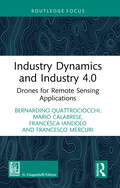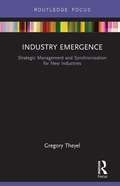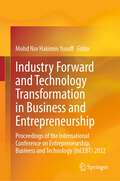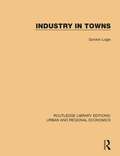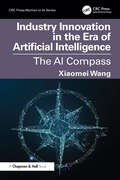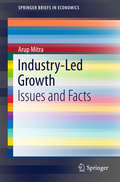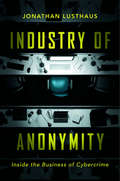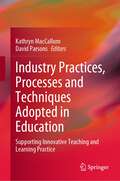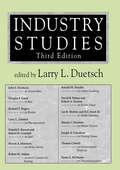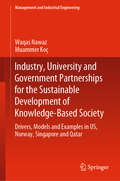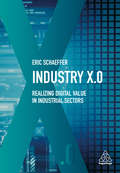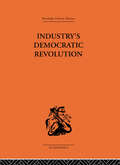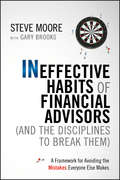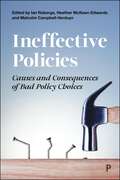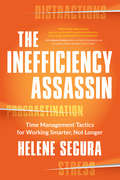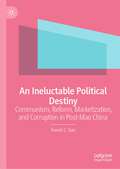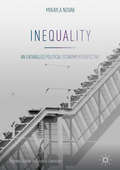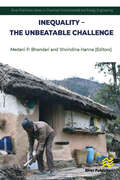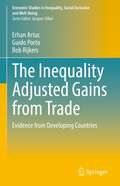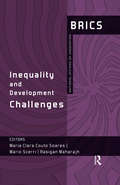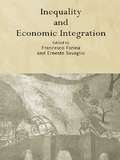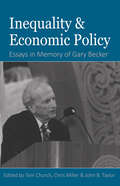- Table View
- List View
Industry Dynamics and Industry 4.0: Drones for Remote Sensing Applications (Routledge-Giappichelli Studies in Business and Management)
by Bernardino Quattrociocchi Mario Calabrese Francesca Iandolo Francesco MercuriThe so-called Fourth Industrial Revolution has prompted companies to adapt to a new business paradigm based on digital interconnection and the ability to respond quickly to the needs of consumers and users. These conditions are closely related to the advent of digital technologies that enable the real-time integration of devices and the control of production systems through technological platforms. Based on this logic, this volume aims to investigate the forms and methods being used by the company at present to confront the new business paradigm, commonly known as Industry 4.0, as well as the impact of new digital technologies on corporate evolutionary dynamics and related business models. More specifically, technological challenges will assess the impact of new technologies on productivity and investment in complementary resources—including human, organizational, and managerial capital—as well as the effects related to the introduction of Internet of Things (IoT)-based production processes. By following this approach, the focus subsequently shifts to drone technology, which is considered by many to be one of the most revolutionary Industry 4.0 technologies. In addition to investigating the history and potential applications of drones, many of which proved to be fundamental during the COVID-19 pandemic, the volume emphasizes the related ethical and social aspects such as the degree of knowledge regarding and the public acceptance of drones. The academic and professional approach of this volume allows it to serve as a guide for professionals, entrepreneurs, and academics with a particular interest in both digital innovation and the drone sector.
Industry Emergence: Strategic Management and Synchronization for New Industries
by Gregory TheyelThis book develops a novel industry emergence framework to explain the features, interaction, and synchronization of key elements for the birth and growth of new industries.Organized around seven elements—firm strategy, technology, investment, supply networks, production, markets, and government—Theyel’s framework provides inventors, managers, investors, scholars, and policymakers with a comprehensive understanding of how industries emerge, helping them to be more successful at influencing the birth and growth of new industries. Understanding industry emergence is important because new industries can offer the advancement of technology, improvements in human health and the environment, growth of firms, creation of jobs, and economic development. With learning objectives, theory, tools, case studies, and end-of-chapter questions, Industry Emergence will be a useful resource for students and professionals in engineering, science, business, and policy.
Industry Forward and Technology Transformation in Business and Entrepreneurship: Proceedings of the International Conference on Entrepreneurship, Business and Technology (InCEBT) 2022
by Mohd Nor Hakimin YusoffThis book, bringing together selected papers from the 10th International Conference on Entrepreneurship, Business and Technology (InCEBT) on the overarching theme of ‘Industry Forward and Technology Transformation in Business and Entrepreneurship’, provides the audience some preliminary understanding of the current and emerging trends in entrepreneurship and business activities. This includes the usage of information and digital technology in business, competition in a digital economy, its challenges and opportunities, and transformation of business and entrepreneurship for the forward industry.
Industry Genius: Inventions and People Protecting the Climate and Fragile Ozone Layer
by Stephen Andersen Durwood ZaelkeThis book presents the inventive genius behind technological breakthroughs by ten global companies including Alcoa, DaimlerChrysler, Honda, ST Micro and Visteon. Readers will gain understanding and insight into how cutting-edge technology is helping protect the climate and/or the ozone layer, while contributing to the company's bottom line. Each chapter chronicles the challenge and triumph of invention, introduces the engineers and executives who overcome conventional wisdom, and demonstrates the contribution these companies are making to environmental protection. In full colour and crammed with graphics to illustrate the creative process of technological breakthroughs, the book is accessible and informative. The genius of these ten companies will inspire the engineer, the policy-maker, the student, the environmentalist, the CEO and the investor alike.
Industry in Towns (Routledge Library Editions: Urban and Regional Economics)
by Gordon LogieOriginally published in 1952. This book addresses one of the most pressing problems in town planning – the proper place of industry in our towns. The author writes from the standpoint of a town planner who realizes that factories are just as important as houses and schools, and that if industry does not prosper, all our schemes for urban reconstruction must fail through the lack of the necessary resources. In the course of his research he has visited hundreds of factories to get the necessary facts at first hand. Almost as a by-product he describes in simple terms the manufacture of such varied objects (to paraphrase Lewis Carroll) as "ships and needles and silverware; chocolates and glue." Plenty of photographs of industrial buildings in Britain and abroad are included, which show how great an architectural transformation is possible, and that an industrial area can become one of the showplaces of a town.
Industry Innovation in the Era of Artificial Intelligence: The AI Compass (CRC Press Women in AI Series)
by Xiaomei WangThis book explores the multifaceted nature of AI implementation in modern business strategy, focusing on its present and future impact on various sectors. The book will spark fresh thinking and provide a driving force for global industrial innovation. Author Xiaomei Wang, Founder and CEO of PathoAI, former Global Leader of Big Data and Analytics at IBM, as well as General Manager of IBM Growth Markets Unit Big Data Centers, draws on over 20 years of experience in data analytics and AI to offer unique insights and a rich collection of compelling industry case studies.Designed for business leaders, tech enthusiasts, and policymakers alike, this book is not just a manual for understanding AI, but a road map for harnessing its potential. By offering a blend of theoretical insight and practical guidance, this book empowers readers to embrace AI as a catalyst for innovation and sustainable growth in their respective fields.
Industry-Led Growth
by Arup MitraThe book explores, for India and other developing countries, the potential role the organized manufacturing sector could play as an engine of growth. Alongside growth, can this sector generate adequate employment opportunities to facilitate the transfer of labour from the agriculture sector? The book identifies the major constraints that result in limited demand for labour in the organised manufacturing sector. Beyond technological aspects, skill shortage is an important factor, resulting in sluggish labour absorption. Further, the labour market laws are not necessarily the root cause of sluggish employment growth in the organised manufacturing sector. The development of technologies that are appropriate for labour surplus countries like India is instrumental to employment creation. Though innovation is generally assumed to be capital-intensive in nature, the book argues that innovation nevertheless has a positive effect on employment in absolute terms. Lastly, the main policy issues are highlighted in terms of the priority that should be assigned to industries which can contribute to employment growth and skill formation for improving the employability of the available labour force, and to which innovations should bepursued, with a specific focus on pro-poor growth objectives.
Industry of Anonymity: Inside the Business of Cybercrime
by Jonathan LusthausJonathan Lusthaus lifts the veil on cybercriminals in the most extensive account yet of the lives they lead and the vast international industry they have created. Having traveled to hotspots around the world to meet with hundreds of law enforcement agents, security gurus, hackers, and criminals, he charts how this industry based on anonymity works.
Industry Practices, Processes and Techniques Adopted in Education: Supporting Innovative Teaching and Learning Practice
by Kathryn MacCallum David ParsonsThis book provides a single source of reference for educators interested in understanding how industry-based ideas have been adapted into different educational contexts, and supports their utilisation in practice. The link between industry-based ideas and their application in education has enabled educators to develop engaging, collaborative, and creative learning environments, as well as better preparing their students for an increasingly complex and dynamic global environment. This book includes contributions from educators, researchers, and practitioners, who have integrated industry-based ideas into their teaching, and explores how these concepts and practices support the creation of effective learning environments. Through these diverse, international contributions, this book enables wider engagement with, and critical analysis of, the application of industry practices, processes and techniques in the development of collaborative and creative learning environments.
Industry Studies
by Larry L. DuetschFeaturing new chapters on casino gambling and the nursing home industry, and updated throughout, the new edition of this highly readable text analyzes well-defined industries from commodities and manufacturing to distribution and services, showing how firms compete with one another. Each study gives appropriate attention to government policies that have influenced competitive conditions in the industry, and the material is presented without the use of calculus so that anyone with some background in economic principles can benefit from it. The book provides balance in regard to the mix of industries dealt with, and also in the varying perspectives of the contributors.
Industry Transformation
by Michael E. Porter Jan W. RivkinOne of the steepest challenges a strategist faces is to navigate his or her company through a period of industry transformation--an era of rapid and wholesale changes in industry structure. This note considers how periods of transformation typically unfold. It then examines how the core tools of the strategist can be deployed during such periods and how new tools come to the fore. Periods of industry transformation pose grave threats and tremendous opportunities to companies. Industry leaders are often unseated during such times, replaced by underdogs and entrants. Perhaps most importantly, periods of transformation give companies unusual latitude to influence future industry structure. Teaching purpose: Designed to support course modules that consider strategy-making under uncertainty or the intersection of competitive strategy and technology.
Industry, University and Government Partnerships for the Sustainable Development of Knowledge-Based Society: Drivers, Models and Examples in US, Norway, Singapore and Qatar (Management and Industrial Engineering)
by Waqas Nawaz Muammer KoçThis book discusses the rapidly growing interest in economic diversification through partnerships between industry, university and government (IUGP), with a focus on the economic diversification of the state of Qatar. It provides a comparative account of the knowledge ecosystem in the USA, Norway, Singapore and Qatar, and offers an evolutionary, national economic-transformational perspective on legislation, institutional and cultural settings, intermediary structures, and support programs. Providing a broad overview of the knowledge ecosystems in these countries, it is suitable for readers at various learning levels. It also includes case studies and a concise comparison of the Global Innovation Index (GII) of the four countries, and explores in detail the under-par comparative performance of Qatar, revealing that the country is still at the engagement level of IUGP. Further, it proposes evidence-based recommendations and strategies, making it a valuable resource for researchers, graduate students and policymakers.
Industry X.0: Realizing Digital Value in Industrial Sectors
by Eric SchaefferIndustry X.0 takes an insightful look at the business impact of the Internet of Things movement on the industrial sphere. Eric Schaeffer combines deep analysis with practical strategic guidance, and offers tangible and actionable recommendations on how to realise value in the current digital age. Based on extensive research and insights into the six core competencies that have been identified by Accenture, Industry X.0 explores critical aspects of the Industrial Internet of Things (IIoT), discussing and defining them in an engaging and accessible manner. These include managing smart data, handling digital product development, skilling up the workforce, mastering innovation, making the most of platforms and ecosystems, and much more. Meticulously researched and clearly explained, Industry X.0 makes a stringent case for companies to actively shift mind-sets away from products, towards services, value and outcomes. Complemented by a wealth of case studies and real world examples, this book provides invaluable, practical 'how-to' advice for business organizations as they embark on their journeys into the era of the IIoT.
Industry's Democratic Revolution
by Charles LevinsonCovering the role of trades unions and labour organizations in industrial relations, Industry's Democratic Revolution contains case studies from Austria, Canada, France, Germany, Israel, Norway, Sweden, Switzerland, the UK and USA. Each chapter is authored by a President or Secretary General of one of the largest industrial unions from that particular country, which gives an unparalleled insight into the workings of unions and their participation in the key issues of industrial relations such as:* Productivity factors* Guaranteed wages* Union participation in management decision-making* De-centralization of industrial power* Policy research
Ineffective Habits of Financial Advisors (and the Disciplines to Break Them): A Framework for Avoiding the Mistakes Everyone Else Makes
by Steve MooreA how to guide to avoiding the mistakes ineffective financial advisors most often make Based on a 15-year consulting program that author Steve Moore has led for financial advisors, Ineffective Habits of Financial Advisors (and the Disciplines to Break Them): A Framework for Avoiding the Mistakes Everyone Else Makes details proven techniques which allow advisors to transform their business into an elite practice: business analysis, strategic vision, exceptional client service, and acquiring high net worth clients. Told through the story of a purely fictional and completely average financial advisor, each chapter begins with an ineffective habit that is then countered with a discipline that improves business results and adds value. The book Details a step-by-step strategy for working through current clients, rather than relying on cold calling to form new relationships Includes anecdotes collected through both personal experience and stories relayed to him by clients and colleagues Provides question and answer segments, examples, and homework assignments Ineffective Habits of Financial Advisors (and the Disciplines to Break Them shows you how to deliver exceptional service while generating higher revenue per client.
Ineffective Policies: Causes and Consequences of Bad Policy Choices
by Ian Roberge, Heather McKeen-Edwards, and Malcolm Campbell-VerduynAvailable open access digitally under CC-BY-NC-ND licence. Bad policies have repercussions that can be felt for decades. But what makes a bad policy? And how can it be reversed or improved? Bringing together scholars from Europe and North America, this book goes beyond traditional policy theory to study bad and ineffective policies across three fields: • the environment; • the financial services sector; and • emerging technologies. Using cutting-edge research and analysis, the editors and authors state the case for studying ineffective policies, demonstrate their harmful effects across policy fields and provide policy makers with the tools to reflect, identify, and act upon them.
The Inefficiency Assassin
by Helene SeguraSlay Procrastination, Distraction, and Overwhelm! Who doesn't want more time and energy for family, friends, and personal passions? Author Helene Segura coaches real people in the real world to operate more efficiently during the workday, so they can have a life outside it. Her engaging time management program caters to diverse learning styles, offering case studies that allow readers to self-diagnose and zero in on the strategies most appropriate for them. Anyone wanting to streamline workflow and improve productivity can employ her wonderfully doable techniques -- for clearing task lists, handling reminder systems, scheduling a variety of priorities, and even managing emails and phone calls. Thanks to Segura's astute attention to personality, The Inefficiency Assassin meets readers where they are struggling and details quick and easy-to-implement strategies to, as Segura promises, "kick chaos to the curb."
An Ineluctable Political Destiny: Communism, Reform, Marketization, and Corruption in Post-Mao China
by Forest C. SunThis book offers comprehensive review and analysis of official corruption in post-Mao China, arguing that this complex political and social malaise is the consequence of a variety of contributing factors, which include political, social, traditional/cultural, or structural, institutional, governance or policy failures. This study distinguishes itself from the methodologies of other studies by classifying corruption into detailed categories and sub-categories, accompanied by abundant cases and examples of the irregularities and offences. Contents are organized into four categories – bureaucratic corruption, regulatory corruption, corruption in judiciary, and corruption characteristic of socialist reform China, and each category is further divided into detailed subcategories to pin down the patterns, actors, loci, as well as inducements of corruption originated from either political institutions, economic structures, or sociocultural norms. Given its comprehensiveness and in-depth of information and analysis, this book is a useful reference for those interested in political and government corruption in post-Mao China.
Inequality
by Lisa A. Keister Darby E. SouthgateWealth ownership in the United States has always concentrated in the hands of a small minority of the population. Because of scarce data on wealth ownership, the nature of wealth ownership distribution and knowledge about wealth inequality has received little attention from social scientists. Keister synthesizes theory and data from various sources to present a picture of househould wealth distribution from 1962 to 1995. Utilizing existing survey data and a unique simulation model, she isolates and examines processes that create this distribution, paying particular attention to the wealth ownership and accumulation of top wealth holders, those who control the bulk of household wealth. She identifies trends in wealth mobility that are not possible to estimate with traditional research methods. The results underscore the importance of wealth as an indicator of well-being, identify important causes of wealth inequality, and propose methods of lessening the recent increase in the concentration of wealth.
Inequality: An Entangled Political Economy Perspective (Palgrave Studies in Classical Liberalism)
by Mikayla Novak‘This book is a thoroughly researched and well written exploration of one of the most divisive topics in modern democratic discourse. Novak brings careful and clear thinking to a topic too often clouded in emotion and guided by moral intuition. ‘—Peter Boettke, Professor of Economics and Philosophy, George Mason University, USA‘Inequality has bred a climate of hostile political discourse reminiscent of the cold war. In this lucid book, Novak explains how we can transcend that hostility by recognizing the deeply entangled character of politics and economics within modern societies.’—Richard E. Wagner, Hobart R. Harris Professor of Economics, George Mason University, USA‘Mikayla Novak has provided a bold new intellectual foundation for social policy analysis.’ —Jason Potts, Professor of Economics, RMIT University, AustraliaIn recent years the degree of income and wealth inequality within developed countries has been raised as a central issue in economic and social policy debates. Numerous figures across diverse ideological affinities have advocated policy measures to significantly alter income and wealth distributions, while the inequality debate has become infused with other subjects such as social justice and identity politics. This book presents an account of economic inequality from a contemporary classical liberal perspective. Inequality is seen as a by-product of entangled relationships within society, bringing to the fore key ideas from complexity, evolutionary and network sciences.Novak illustrates that inequality is problematic insofar as it generates pro-rich redistribution and constrains progress by the less well off. Economic inequality has important links with issues such as fiscal and regulatory policies, discrimination and social exclusion, and institutional design.This unique book is important reading for social science academics, policy makers and people interested in exploring the dimensions and solutions to inequality, a critical issue of our time.
Inequality – the unbeatable challenge
by Medani P. Bhandari Shvindina HannaThis edited book presents some unexplored issues of economic inequality, including case studies of various countries. Inequality is a chronic and divisive factor of society. Inequality exists as an integral attribute of human development. Communities, nations, and systems are not evolving at the same speed and rate and thus require different resources in different amounts. However, the distribution of winnings is also uneven due to the multidimensionality of influencing factors.When we talk about inequality, it is not just inequality of income or wealth; it is first, inequality in access to priorities and human needs – to shelter, to clean water, air, health care, and also to appropriate vaccination systems and assistance, security systems and safety guarantees for the future. Past financial crises and the current pandemic shock has revealed bugs in the system, shaking it and changing our perception of the norms.We may have no doubts that inequality is an unsolved problem, but now we need to find out - is it unbeatable? There is still lack of knowledge around how inequality has been grounded throughout human civilization, why society is stratified and classified, economically, politically, socially, and religiously; and why the discrimination due to gender, sexual orientation, country of origin, language differences, immigration status, caste, race and ethnicity? This book addresses these issues in a holistic way as well as including case studies of various countries. It tries to find out why inequality has been unbeatable and what would be the best policies to overcome this challenge.
The Inequality Adjusted Gains from Trade: Evidence from Developing Countries (Economic Studies in Inequality, Social Exclusion and Well-Being)
by Erhan Artuc Guido Porto Bob RijkersThis volume examines the relationship between trade liberalization policies and income inequality in developing countries. Using survey data for 54 developing countries, the book explores the potential trade-off between the gains from trade and the distribution of those gains and provides a quantification of the inequality-adjusted welfare gains from trade. The book begins with an introduction to the model and its methodology. Chapter 2 sets up the model and derives the formulas for the welfare effects of trade policy. Chapter 3 uses the tariff data and the survey data to estimate those welfare effects in 54 countries. Chapter 4 discusses the gains from trade and their distribution. Chapter 5 evaluates and quantifies the trade-off between income gains and inequality costs of trade. Chapter 6 presents robustness tests and results from alternative models of the impacts of trade. The last chapter reviews the Household Impacts of Trade database and dashboard, which provides data for replication and a platform that allows researchers to simulate agricultural tariff policy shocks. Providing a comprehensive empirical analysis of the effects of trade policy on inequality in developing countries, this volume will be of interest to researchers and students of economic inequality, development, and international trade as well as policymakers interested in the inequality and poverty consequences of trade policy.
Inequality and Development Challenges: BRICS National Systems of Innovation
by Maria Clara Couto Soares Mario Scerri Rasigan MaharajhThis series of books brings together results of an extensive research programme on aspects of the national systems of innovation (NSI) in the five BRICS countries — Brazil, Russia, India, China, and South Africa. It provides a comprehensive and comparative examination of the challenges and opportunities faced by these dynamic and emerging economies. In discussing the impact of innovation with respect to economic, geopolitical, socio-cultural, institutional, and technological systems, it reveals the possibilities of new development paradigms for equitable and sustainable growth. This volume analyses the co-evolution of inequality and NSI across the BRICS economies. It reveals the multi-dimensional character of inequality, in going beyond its income aspect to include assets, access to basic services, infrastructure, knowledge, race, gender, ethnicity and geographic location. In advancing valuable policy recommendations, the book argues that inequalities must be factored in development strategies given that benefits of innovation are not automatically distributed equally. Original and detailed data, together with expert analyses on wide-ranging issues, make this book an invaluable resource for researchers and scholars in economics, development studies and political science, in addition to policy-makers and development practitioners interested in the BRICS countries.
Inequality and Economic Integration (Routledge Siena Studies in Political Economy)
by Francesco Farina Ernesto SavaglioInternationally, globalization and increased economic integration has impacted quality of life and individual well-being. Attempts to evaluate the impact on income dispersion from this process have been extremely controversial. This key volume is the first real attempt to build up indices and a theoretical framework in order to deal with inequality of opportunity, and to enable social and political institutions to monitor increasing disparities in well-being and social exclusion. It thoroughly examines the possible relationships between the recent acceleration in economic integration and inequality among persons and countries and will enable social and political institutions to monitor increasing disparities in well-being and social exclusion. The contributions to this volume cover various subfields of economics, and examine both the negative and positive spillover effects of economic integration on individuals, social groups and nations. Since the impact of globalization on the most deprived people is multidimensional in nature, the theoretical framework is extended to a multivariate context where several individual characteristics are simultaneously considered. This original volume covers many important topics and features an impressive array of respected contributors. As such, it is sure to be an invaluable resource for postgraduates and professionals in the fields of political economy and economics.
Inequality and Economic Policy: Essays In Honor of Gary Becker
by Tom Church, Chris Miller, and John B. TaylorDrawing from a 2014 Hoover Institution Conference on Inequality in honor of Gary Becker, a group of distinguished contributors explore various measures of inequality in America and address the issue of whether or not it is increasing. In looking at this question and examining policy implications, the authors draw on research on human capital and intergenerational mobility. The authors suggest that the emphasis on inequality and redistribution, while not wrong, is nevertheless misplaced, for it may lead us to adopt policies that will disrupt the progress we have made while doing nothing to promote the kind of growth that is essential to national progress.
